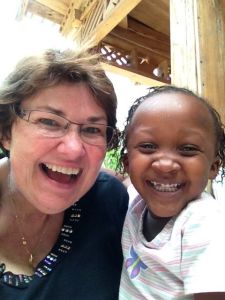
I knew I would see hardship when I came to Haiti. If you’ve been here before you’ve seen the desperate poverty, the pain and you’ve heard people tell you bluntly that they are hungry.
When I moved here — and especially when I was able to spend a month in a mountain village with a family — I was prepared for the tough times I would witness up close and personal.
What surprised me was the tenderness. It was everywhere, tucked into ordinary moments on what to me were extraordinary days.
From the start, I’ve been embraced in Haiti. From my first weeks staying at Trinity Lodge to my time in my apartment on Delmas 75, my friends both old and new have taken me in, advised me, fed me, shared time and jokes with me.
One glance, one “bonjou!” and I receive huge smiles and greetings. The patience with my faltering Kreyol alone is enough to earn them great praise from me, but the Haitians go so much further.
They assure me that I am at home.
It was most quickly and thoroughly evident in Cherident, though. In my last post, I shared with you how naturally and immediately I was brought into the Celestin family. And throughout four weeks, I was given a front-row seat to life in rural Haiti — not all of it perfect, of course, but with moments of grace tucked into the most ordinary occasions.
A few of my favorites:
Herns cutting his father’s hair.
Herns is the second born in the family of eight children. He is 32, and he and his wife, Jennifer and their 2-year-old son, Barns, live in Port-au-Prince. He is trained as an electrician, and in addition to other work when he can find it, he teaches in a technical school. He is a natural teacher — patient but demanding. I know that he looks for the best in others because he often tells me he finds it in me. And this is on the days when my best was not always apparent.
As you know, each of Papa Luc’s children traveled up the unforgiving road to Cherident during my month there — just to spend time with me. It was expected. I would have called it an obligation had the tables been turned — in the grace that is Haitian hospitality, they called it a pleasure. And Herns was there with me from the beginning and occasionally throughout my time there. Kreyol lessons sometimes were more formal, but much of it consisted of me listening and watching daily life.
One evening shortly before dusk, as neighbors dropped by to visit, Papa Luc pulled a wooden chair out into the courtyard, and Herns stood behind him combing and cutting his hair. He used a blue plastic brush, then carefully trimmed Papa Luc’s hair short with a comb that had a razor blade tucked into the teeth of the comb.
Slowly, carefully, tilting his father’s head this way and that, Herns shaped and trimmed and straightened his father’s hair. All the while, the neighbors and Papa Luc and Herns told stories and laughed and enjoyed the natural rhythm of conversation. As dark approached and the job was done, Herns brushed off his father’s shoulders, and Papa Luc replaced his ball cap.
It was an ordinary moment in an extraordinary place.
The teenager and the sick little boy.
Barns was sick with a bad cold. Every day and night, his parents gave the boy medicine, which must not have tasted too bad because he didn’t fight the spoon full of syrup. But the cough continued. One morning when I realized he wasn’t running hither and fro, I asked where he’d gone. His big cousin, Son-Son had taken him to the clinic, his mom told me.
About two hours later, Son-Son, 18, walked back home with a handful of medicines and the boy on his shoulders. That afternoon, I sat on the porch with Son-Son beside me, having one of our many conversations about Scripture, Kreyol, subjects we like to study or music. On his lap, sat a grumpy toddler.
Folding the little boy’s arms and legs into a comfortable position, Son-Son murmured to him. Barns’ crankiness subsided, and when I looked again, he had fallen into a deep sleep.
“Excuse me,” Son-Son said to me in Kreyol, standing carefully and taking the child into the house.
Another very ordinary moment — but my heart melted just a little.
One morning, Herns came home from Papa Luc’s shop where he’d sanded and drilled holes in a wide board. With a huge smile on his face, he set to work building a swing for the children.
Another tender moment.
And there are others. Every day. With every connection I make here, there is a neverending thread. My friends and family call me, text, visit me. They ask if I am eating, if I am sleeping well. My favorite question is one first posed by Goursse, an Episcopal deacon responsible for several churches in and near Cazale.
“Did you dream?” he asked me one morning. “What did you dream?” I would end each good night with “Make good dreams,” and the sentiment was returned.
They still ask, and I tell them about my dreams and ask about theirs.
Haiti is a land of many challenges, but do not — even for a moment — believe that dreams are forsaken here.
Whether the nocturnal wanderings of the mind or the ever-present hopes and plans for tomorrow, dreams are essential here.
And like the strong hands I often found ready and waiting for me on many long walks on narrow, rocky paths across the hills of rural Haiti, we will count on the power of dreams.
And the power of tenderness among our brothers and sisters here. And wherever you are, friends.
Dream — and make good dreams. And notice the tenderness in your days as well.



